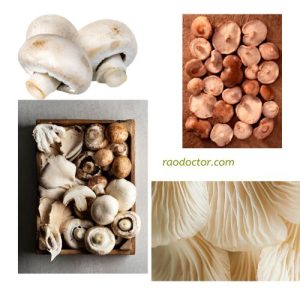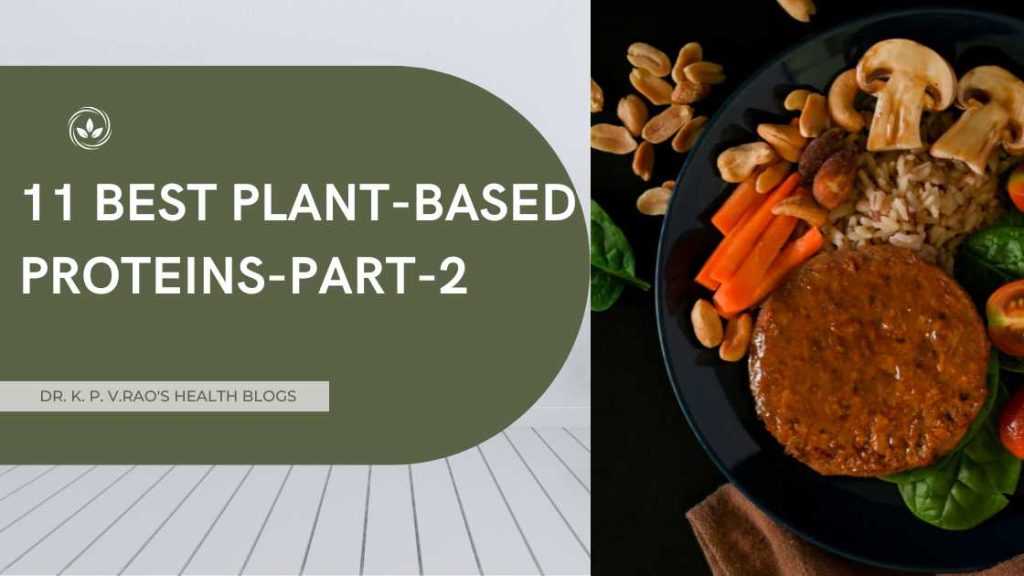Table of Contents
Add these six proteins to make your diet a complete balanced diet
In my last article, I discussed five of the 11 plant-based proteins. The question I am always asked is- are plant-based proteins complete?
There are many sources of proteins, and they should always form a part of our daily diet. {Read this article to know why we need Proteins}
Unfortunately, from my research, I have found out that most of the plant proteins are not complete, meaning they do not contain all the nine essential amino acids that make a protein complete, except for Quinoa and nutritional yeast.
However, if these proteins are combined with legumes, lentils and cereals, we can get all the amino acids that make a complete protein molecule. So, my suggestion is, use these sources of plant proteins together to have a complete meal!
Now, in this article, we will learn all about the remaining six more plant-based proteins.

So, without any ado, let’s begin from we had left-
Seitan:
Seitan is a wheat-based protein made from wheat gluten that is often used as a meat substitute. 100gms of seitan provides around 25gms of protein.

Nutritional Facts:
- 2 grams of fat
- 6 grams of carbohydrates
- 370 milligrams of sodium [in premade products]
- 1.2 milligram of iron [ 15% of RDA]
Seitan is low in fat and carbohydrates, making it a good option for those looking to increase their protein intake while minimizing calorie intake. It is also known as vegan meat. It is useful if you are searching ingredients for a weight loss diet.
Seitan is also a good source of iron, which is important for healthy blood and oxygen transport throughout the body. However, seitan is sometimes high in sodium, especially the readymade one, which can be a concern for those with high blood pressure or other health issues.
Overall, seitan can be a healthy addition to a balanced diet for those who are gluten intolerant or allergic. Example of a seitan dish: Seitan stir-fry with vegetables and brown rice.
Who should avoid seitan?
Those people having gluten allergy, for example, people suffering from celiac disease.
Useful resource- Seitan
Mushrooms

Another source of protein that I enjoy eating often is mushrooms. Even though it contains only 2 grams of proteins in one cup [about 30 grams] of mushroom, they contain many other useful ingredients [see below].
In combination with other sources of proteins, such as cereals, they can make us a wholesome diet.
Nutritional Facts–
- Mushrooms are low in calories and high in nutrition, making them an excellent addition to any diet.
- Mushrooms are a good source of vitamins and minerals, including vitamin D, B vitamins, potassium, copper, and selenium.
- Mushrooms also contain antioxidants that can help protect your body from damage caused by free radicals.
- One cup of sliced, raw mushrooms contains only 15 calories, 2 grams of protein, and 2 grams of fiber.
- Mushrooms are also low in fat and sodium, making them a heart-healthy food choice.
Types of mushrooms and their use-
Examples of popular mushroom varieties include shiitake, portobello, button, and oyster mushrooms.
Shiitake mushrooms, in particular, are a good source of ergothioneine, an antioxidant that may help protect against cancer, heart disease, and other chronic conditions. This mushroom is native to Japan and China.
Portobello mushrooms are a great choice for vegetarians and vegans as they are a good source of protein and can be used as a substitute for meat in many recipes. Portobello mushroom is native to Italy.
Overall, mushrooms are a nutritious and delicious addition to any meal plan.
A tasty recipe for Portobello Mushrooms-Click this link: TheSpruceEats.com
Hemp and Chia Seeds:
Hemp seeds are a great source of plant-based protein and healthy fats. 100gms of hemp seeds provide around 30gms of protein.
Chia seeds are rich in protein, fiber, and other nutrients. 100gms of chia seeds provide around 17gms of protein.
You can read all about the nutritional facts of seeds like chia and hemp seeds here- 10 important seeds
Spirulina:
Spirulina is a blue-green algae found mostly in water bodies like lakes and ponds that grow them for commercial purposes, which is high in protein and other nutrients. 100gms of spirulina provides around 57gms of protein.
Nutritional Facts:
Spirulina is a type of blue-green algae that is rich in nutrients and is considered a superfood.
The nutritional facts of 100 gm spirulina are as follows:
- Calories: 290
- Protein: 57.5 gm
- Carbohydrates: 23.9 gm
- Fiber: 3.6 gm
- Fat: 3.6 gm
- Vitamins
- Vitamin A: 22,000 IU
- Vitamin B1 (Thiamin): 2.38 mg
- Vitamin B2 (Riboflavin): 3.67 mg
- Vitamin B3 (Niacin): 12.82 mg
- Vitamin B6 (Pyridoxine): 0.364 mg
- Vitamin B9 (Folate): 94 mcg
- Vitamin C: 10.1 mg
- Vitamin E: 5 mg
- Minerals
- Calcium: 120 mg
- Iron: 28.5 mg Magnesium: 195 mg
- Phosphorus: 118 mg
- Potassium: 1363 mg
- Sodium- 1023 mg
- Zinc- 2 mg
Spirulina is also rich in antioxidants, which help fight free radicals and lower the risk of chronic diseases.
It is a good source of both essential and non-essential amino acids, which are important for building and repairing tissues in the body.
Spirulina is also high in chlorophyll, which may help remove toxins from the body and improve digestion.
Some studies suggest that spirulina may help lower blood pressure, reduce cholesterol levels, and improve immune function.
A word of caution-
Even though spirulina is considered a superfood, it has some shortcomings. There are some studies that show that they may not be that safe for us. Research has shown that spirulina may be contaminated with toxins such as heavy metals like mercury, which is harmful to our brains and general health.
Useful resource- Spirulina -Are there Health Benefits?
Nutritional Yeast:
Nutritional yeast is a popular vegan food that is high in protein and other nutrients. 100gms of nutritional yeast provides around 50gms of proteins.

Nutritional yeast is a highly nutritious food product that is commonly used as a vegan cheese substitute.
It is low in calories and fat, making it a popular choice for those looking to maintain a healthy weight.
It is also an excellent source of protein, providing all nine essential amino acids that the body needs to function properly
Nutritional Facts:
Nutritional yeast is rich in B-complex vitamins, including thiamine, riboflavin, niacin, and vitamin B6, which are essential for energy production and healthy skin, hair, and nails.
It is also a good source of minerals such as zinc, selenium, and magnesium, all of which are important for maintaining healthy immune function and bone health.
Many brands of nutritional yeast are fortified with vitamin B12, a nutrient that is typically only found in animal products, making it an ideal addition to a vegan or vegetarian diet.
For example, 2 tablespoons of Red Star Nutritional Yeast provide
- 60 calories
- 5 grams of protein,
- 4 grams of fiber,
- Vitamins: 25% of the recommended daily intake of these vitamin B
- thiamine,
- riboflavin,
- niacin,
- vitamin B6,
- folate, and
- B12
- 20% of daily requirement of minerals like Zinc and Selenium
Nuts
Almost all the nuts we eat contain a high amount protein along with other beneficial nutrients. I will not elaborate on this as I have already discussed nuts in great detail in a previous article. If you have not read it already, you can do so here- 10 Best Nuts to Keep You Healthy
Conclusion
Before I conclude this article, I suggest you listen to this podcast on YouTube by Dr. Michael Gregor-
As more people are turning towards a plant-based lifestyle, the demand for plant-based proteins is on the rise. Plant-based protein sources are not only healthier but also environmentally sustainable.
Proteins are also available in small quantities in fruits like avocado. They can be combined with vegetables to make a sandwich with bread to make a wholesome meal.
However, it can be challenging to find plant-based proteins that provide the same amount of protein as animal-based sources.
Luckily, there are several plant-based proteins that are high in protein content and can easily replace animal-based proteins.
All of these plant-based proteins not only provide considerable amounts of protein but also offer other essential nutrients like fiber, vitamins, and minerals.
Incorporating them into your diet can help you meet your daily protein requirements and maintain a healthy lifestyle. So, don’t hesitate to switch to a plant-based protein diet and enjoy the benefits of a healthier and more sustainable lifestyle.
Useful Resource-
Sources of Great Plant-based Proteins:
You can buy all these plant-based proteins online on Amazon.com country wise, by clicking the links provided below-
Disclosure:
The links used above are affiliate links. Meaning, if you make a purchase using these links, I will get a commission, at no extra cost to you. This helps me in getting such articles free to you. Please be rest assured that I only recommend products I genuinely believe in, and trust to be good for you too.
Final Words:
If you have found this article, please do consider sharing through the social icons at the bottom of this article. Alternately, you can Click to Tweet here-
11 Plant-based Proteins- Part 2 Share on XMy next article will be on the diseases of lowest part of our gastrointestinal system- Anorectal Health, in which I will be covering Piles, Fissures and Fistulas.

